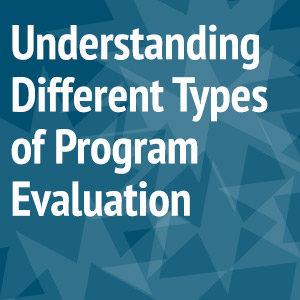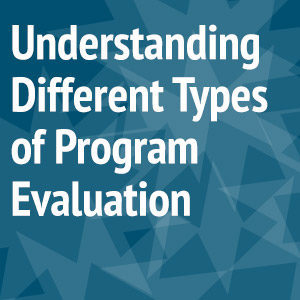The Tyranny of Metrics
In a recent article “Against Metrics: How Measuring Performance by Numbers Backfires,” Jerry Z Muller argues that companies, educational institutions, government agencies, and philanthropies are
In a recent article “Against Metrics: How Measuring Performance by Numbers Backfires,” Jerry Z Muller argues that companies, educational institutions, government agencies, and philanthropies are
Organizations vs. Programs Organizations are social collectivities that have: members/employees, norms (rules for, and standards of, behavior), ranks of authority, communications systems, and relatively stable
Surveys can be an efficient way to collect information from a substantial number of people (i.e., respondents) in order to answer evaluation research questions. Typically,
One of the most important questions to consider before starting an evaluation is, “How will evaluation findings be used?” There are a number of ways
When you and your colleagues consider conducting an evaluation, it is critical that you be clear about who the evaluation is for. Your organization is
This is the first in a series of blog posts, that outlines the key elements of an evaluation. There are many things in the world
“Evidence-based” – What is it? “Evidenced-based” has become a common adjectival term for identifying and endorsing the effectiveness of various programs and practices in fields
Periodically, I share with you and your colleagues information and resources that are of special interest to the non-profit sector. In May, a colleague of
How do programs know what they should be doing— which target populations require services, the types of services programs should provide, the amounts of services,

Program evaluations are conducted for a variety of reasons. Purposes can range from a mechanical compliance with a funder’s reporting requirements, to the genuine desire
In a recent article “Against Metrics: How Measuring Performance by Numbers Backfires,” Jerry Z Muller argues that companies, educational institutions, government agencies, and philanthropies are
Organizations vs. Programs Organizations are social collectivities that have: members/employees, norms (rules for, and standards of, behavior), ranks of authority, communications systems, and relatively stable
Surveys can be an efficient way to collect information from a substantial number of people (i.e., respondents) in order to answer evaluation research questions. Typically,
One of the most important questions to consider before starting an evaluation is, “How will evaluation findings be used?” There are a number of ways
When you and your colleagues consider conducting an evaluation, it is critical that you be clear about who the evaluation is for. Your organization is
This is the first in a series of blog posts, that outlines the key elements of an evaluation. There are many things in the world
“Evidence-based” – What is it? “Evidenced-based” has become a common adjectival term for identifying and endorsing the effectiveness of various programs and practices in fields
Periodically, I share with you and your colleagues information and resources that are of special interest to the non-profit sector. In May, a colleague of
How do programs know what they should be doing— which target populations require services, the types of services programs should provide, the amounts of services,

Program evaluations are conducted for a variety of reasons. Purposes can range from a mechanical compliance with a funder’s reporting requirements, to the genuine desire
In a recent article “Against Metrics: How Measuring Performance by Numbers Backfires,” Jerry Z Muller argues that companies, educational institutions, government agencies, and philanthropies are
Organizations vs. Programs Organizations are social collectivities that have: members/employees, norms (rules for, and standards of, behavior), ranks of authority, communications systems, and relatively stable
Surveys can be an efficient way to collect information from a substantial number of people (i.e., respondents) in order to answer evaluation research questions. Typically,
One of the most important questions to consider before starting an evaluation is, “How will evaluation findings be used?” There are a number of ways
When you and your colleagues consider conducting an evaluation, it is critical that you be clear about who the evaluation is for. Your organization is
This is the first in a series of blog posts, that outlines the key elements of an evaluation. There are many things in the world
“Evidence-based” – What is it? “Evidenced-based” has become a common adjectival term for identifying and endorsing the effectiveness of various programs and practices in fields
Periodically, I share with you and your colleagues information and resources that are of special interest to the non-profit sector. In May, a colleague of
How do programs know what they should be doing— which target populations require services, the types of services programs should provide, the amounts of services,

Program evaluations are conducted for a variety of reasons. Purposes can range from a mechanical compliance with a funder’s reporting requirements, to the genuine desire
Please enter your information below to receive a copy of this whitepaper.
Please enter your information below to receive a copy of this whitepaper.
Please enter your information below to receive a copy of this whitepaper.
Please enter your information below to receive a copy of this whitepaper.